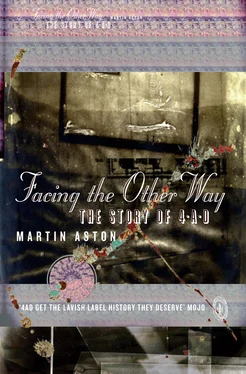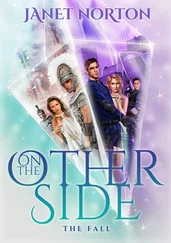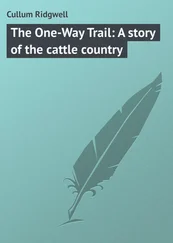That would be the suspenseful saga of Manchester’s Factory Records, 4AD’s principal peer in the world of pioneering, inventive and maverick independent labels. For both labels, the visual aesthetic was as crucial as the music, yet, in many ways, south London’s 4AD, formed in 1980, was the anti-Factory: its spearhead, Ivo Watts-Russell, was more of a recluse than a media-savvy self-promoter, and 4AD had no recognisable ties to the zeitgeist – nor to any cultural trend, in fact. All of that , Ivo felt, was irrelevant; only the artefact mattered – the music and its exquisite packaging. In the mid-Eighties there were constant references to ‘the 4AD sound’: a beautiful, dark, insular style. If the 2002 fictionalised film about Factory Records was called 24 Hour Party People , what might a film about 4AD be titled – Eight Hours Chilling, and Then Bed ?
But whilst 4AD’s story may be less sensational and populist than Factory’s, it is equally gripping, the label’s A&R vision being that much greater, and its subsequent cast of characters even more fascinating and beguiling. Under Ivo, 4AD’s vision chimed with a rare era in British pop history when there was a sizeable market for innovation and experimentation. The artists he was drawn to were trailblazers, outsiders whose unique perspective invariably included a troubled, sometimes irreconcilable relationship with the mainstream (scoring the UK’s first independently released number 1 single was as much the beginning of the end for 4AD as it was the start of a new era), and with each other, like a dysfunctional family – and that includes the staff at the record label.
Like the motion of the swan’s legs beneath its ineffably elegant glide across water, below the surface of 4AD’s dazzling and enigmatic artwork and music the human drama unfolded. 4AD’s journey began as a shared discovery of a new world of sound and opportunity in the aftermath of the punk rock revolution. But its community was progressively fractured by splits, rivalries, writs, personal meltdowns, addiction, and depression – not least of the victims being 4AD’s most iconic artists Cocteau Twins, Pixies and The Breeders, and the label boss as well.
Though 4AD became increasingly popular in the first half of the Nineties, the shifts in the cultural climate and music business practise, as the major labels and the mainstream sought to exploit ‘alternative music’, was enough to shatter Ivo’s dream to the point that he sold up in 1999 and disappeared into the New Mexico desert, cutting all ties to the music industry.
Also unlike Factory, 4AD has survived – some even claim that in the twenty-first century, the label, under new stewardship, has reclaimed its former glory. However, it is the Eighties and Nineties, the years under Ivo’s tutelage, that are the real story. This is the period that Facing the Other Way concentrates on: a time in which the word ‘4AD’ became an adjective, when 4AD was the most fanatically appreciated and collected of record labels, whose legacy casts a long shadow over contemporary music, from dream-pop, goth, post-rock and industrial to Americana, ambient, nu-gaze and chillwave. Not forgetting Pixies’ indelible influence on Nirvana, whose impact pushed alternative rock into the mainstream, after which there was no return.
There was no return for Ivo either. His non-existent profile since the end of the twentieth century means that one of the great sagas of British-label history had not been told. That is, until I went looking for him in 2010.
I’d been a 4AD fan throughout the earlier years, from Bauhaus’ early singles to The Birthday Party and Cocteau Twins, and as soon as I started writing about music, in 1983, I’d had a close working relationship with Ivo. Over the years, I’ve covered numerous 4AD artists, and been beguiled and exhilarated by the procession of sounds and names: Dif Juz, This Mortal Coil, Dead Can Dance, Throwing Muses, Pixies, The Wolfgang Press, His Name Is Alive, Lush, Red House Painters, Tarnation … But, in the wake of Ivo’s retreat, our last correspondance was in 2002 (regarding some sleevenotes I was writing about one of Ivo’s favourite 4AD signings). Arguably, a book on 4AD could have been written then, but it makes more sense now, with the label’s reputation, and myth, increasing year on year. This is a testament to a label that existed purely on its own terms, out of time and place with the rest. Facing the other way. Sometimes it’s the quiet ones you have to look out for …
chapter 1
Did I Dream You Dreamed About Me?
Creativity is a product of a diseased mind.
(Dee Rutkowski, 2011)
I have the strangest dreams every night … been going on for months. Unlike my waking life, the dreams are full of strangers that I am forced to interact with. I’m not sure whether I experience greater feelings of alienation asleep or awake.
(Ivo, by email, 2012)
Yes: I am a dreamer. For a dreamer is one who can only find his way by moonlight, and his punishment is that he sees the dawn before the rest of the world.
(Oscar Wilde, sometime in the late nineteenth century)
May 1985. The phone rings at Ivo’s home on a Saturday afternoon. ‘It’s David Lynch’s assistant: are you free to talk to him?’
The American film director behind the startling, surreal Eraserhead and the dramatically different, but equally affecting, biopic The Elephant Man had a new film in pre-production, titled Blue Velvet , and he’d fallen for a song that he wanted to use for the opening sequence, set at a high-school prom.
The song was a cover of Tim Buckley’s ‘Song To The Siren’, a mercurial, exquisite ballad that described, in aching and elaborate homage to the ancient Greek poet Homer’s epic The Odyssey , the inevitable damage that love causes. Buckley’s original, which the Californian singer-songwriter had written and first recorded in 1968, wasn’t at all well known, even by 1985. Between 1966 and 1974, he’d recorded a startling array of music over the course of nine albums, from folk rock to jazz to avant-garde to funky soul and AOR. It all ended with a snort of heroin at an end-of-tour party. With rock and pop culture yet to turn nostalgic, Buckley’s reputation had died with him, and punk rock’s Stalinist purge of the past had ensured that Californian singer-songwriters of all pedigrees were discourteously dismissed.
But this new cover version of ‘Song To The Siren’, by a studio-based collective named This Mortal Coil, had sprung up in a very different climate. Punk had given way to its more experimental, artful offspring, post-punk, alongside the new electronic sound, and the synthesised pop called New Romantic. ‘Song To The Siren’ had spent more than a hundred weeks in the British independent music charts during 1983 and 1984, and its fame had reached America, as David Lynch’s interest illustrated. He regards TMC’s version as his all-time favourite piece of music: ‘That song does something to me, for sure,’ he told the Guardian newspaper in 2010.
In either version, ‘Song To The Siren’ was an easy track to be infatuated with, given its sorrowful, elegiac mood, and its lyrics haunted by images of the sea and of death. The singer of This Mortal Coil’s version was Elizabeth Fraser, whose performance – supported in spirit by the guitar of her musical and romantic partner Robin Guthrie – suggested that she was the siren of The Odyssey personified, luring sailors/lovers to a watery grave.
In their daily lives, Fraser and Guthrie were known as Cocteau Twins, recording artists for the independent music label 4AD. It was 4AD’s co-founder, and singular leader, Ivo Watts-Russell, that had taken Lynch’s call that afternoon. ‘As happens,’ Ivo recalls, ‘when the film went into production, my friend Patty worked as an assistant to the producer on Blue Velvet . She’d call me, whispering, “David and Isabella [Rossellini, the female lead] are in the corner again , listening to ‘Song To The Siren’,” before shooting a scene.’
Читать дальше












